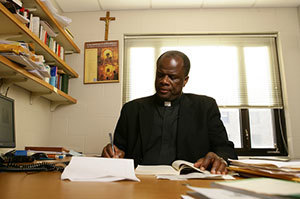 Rev. Paulinus I. Odozor, C.S.Sp.
Rev. Paulinus I. Odozor, C.S.Sp.
The election of Jorge Mario Bergoglio, Cardinal Archbishop of Buenos Aires, as Pope Francis nearly two years ago is only one illustration of how the Catholic Church has become less concentrated in Europe and North America than in the southern hemisphere. Nearly half of the world’s 1.1 billion Catholics live in Latin America, and the Catholic Church in Africa, home to the largest seminaries in the world, is growing at an annual rate of more than 3 percent.
University of Notre Dame theologian Rev. Paulinus I. Odozor, C.S.Sp., is mindful of this shift in the Church’s center of gravity and alludes to it as he introduces his new book, “Morality Truly Christian, Truly African: Foundational, Methodological, and Theological Considerations,” recently published by the University of Notre Dame Press.
He also is aware of how such shifts affect the way theology is done. “Every theology is contextual. Our very lives, shaped by the cultures we inhabit, are the contexts in which we are addressed by God’s revelation,” he said recently, “but our theology must not be ‘context-bound.’”
A Nigerian priest and a member of the Notre Dame faculty since 1999, Father Odozor specializes in moral theology, Christian ethics, the history of moral theology, theological inculturation, African Christian theology and the theology of marriage.
In “Morality Truly Christian, Truly African,” Father Odozor examines issues, some of them neuralgic, arising from the enculturation of Catholic moral discourse in a religiously pluralistic African situation. “My hope,” he writes, “is that theologizing in such an open way, as I try to do here in this book, will help to bring the church and the entire theological community into conversation about Christian ethics (moral theology) in the African context so that what goes on in that part of the Christian community will be of interest to all as a ‘Christian theological thing,’ and not just as an ‘African thing.’ I believe that what goes on in the current African church and theology should be of great interest to the theological community elsewhere, given the potential of this emerging church and its current and growing impact on the rest of the church.”
Father Odozor acknowledges and respects the critical distance that African theologians must keep from the European culture that colonized, exploited and despoiled the peoples and traditions of Africa, but insists that “African theology needs to rethink the questions about God, because the God of Jesus Christ is truly new in African culture just as He is new in every other culture.”
As Father Odozor sees it, this “God problem” is crucial to the further development of a truly Christian and African moral theology. “Christianity shares some blame for the God problem in Africa and for its attendant effects due to the haphazard evangelization in the area of God language,” he writes. “In a bid to plant the faith in Africa, Christian missionaries quickly dislodged African divinities from their groves or quickly baptized them with Christian names without a corresponding change in the meaning they mediated. It is my view, therefore, that the place to begin to do Christian theology in Africa today is in the area of God language. It is here we must begin the dialogue with African traditional religion.”
To hear Father Odozor speak of it, that dialogue should be lively. “Our theology must lovingly and seriously paint an image of Jesus Christ,” he said recently, “through the lenses and with the brushes that our cultures provide. And that portrait must indicate something of the Father Jesus describes, who is universally loving, the Father in the parable of the Prodigal Son or the Vintner who pays laborers so irresponsibly. That God will surprise any culture.”
Contact: Father Odozor, 574-631-6583, Odozor.1@nd.edu
Originally published by at news.nd.edu on December 16, 2014.